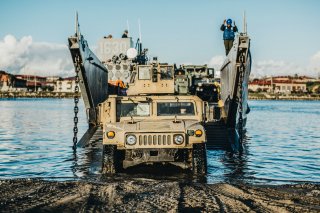How the Marines Are Preparing to Fight the Information War
The Corps’ newest warfighting doctrine covers informational warfare from A to Z.
The nation’s top Marine, Commandant of the Marine Corps Gen. David Berger, just signed off on the Marine Corps’ newest warfighting doctrine, Marine Corps Doctrinal Publication 8. The document, also known by its abbreviation MCDP 8, is the first service doctrine that defines and explains Marine Corps informational warfare.
"Information is key to gaining advantage in all domains, whether during kinetic actions on the battlefield or during day-to-day operations in competition,” Berger said in a Marine Corps statement announcing MCDP 8. “It's especially critical when our Marines need to sense and make sense of the operating environment in support of the joint force or to exploit opportunities and take action against our adversaries," Berger said.
The Marine Corps' statement explained that the purpose of MCDP 8 is firstly to provide a “conceptual framework” for “informational warfighting,” as well as to provide Marine “with increased flexibility in their operational approaches across all phases of the competition continuum, in all warfighting domains.” More information about MCDP 8 can be accessed from the Marine Corps directly online.
“MCDP 8, Information is written within context of Force Design 2030: threat-informed, concept-based and accountable to a campaign of learning,” said Lt. Gen. Matthew Gravy, the Corps’ deputy commandant for information.
“To maximize the information warfighting function we must make it a component of 21st Century Combined Arms—such that we generate, preserve, deny, and project information in full integration with fire and maneuver,” Gravy added.
Though the Marine Corps is a littoral fighting force able to fight from land or at sea, a high-end conflict in the twenty-first century will require adding another fighting domain: the informational space. And this is a space that, like land, sea, and air, the Marine Corps plans to dominate.
The four main tenets of MCDP 8 are information generation, information preservation, information denial, and information projection. Securing these four goals will offer the Marine Corps an information advantage—what the Corps calls an “exploitable condition,” which will allow Marines to “execute information functions” more advantageously than their opponents.
“Any service, or service member, regardless of what their tactical implementation of information is can apply the core concepts outlined in MCDP 8, Information,” stated Eric Schaner, a senior information strategy and policy analyst. “Our intent is to increase overall understanding that information is a warfighting function that can be applied through combined arms and maneuver to support commander’s objectives,” Schaner concluded.
Caleb Larson is a multimedia journalist and defense writer with the National Interest. A graduate of UCLA, he also holds a Master of Public Policy and lives in Berlin. He covers the intersection of conflict, security, and technology, focusing on American foreign policy, European security, and German society for both print and radio. Follow him on Twitter @calebmlarson.
Image: DVIDS.

